Non-Consonantal /heh/ At The End Of A Word - 1.41.2
100.00 %
Hey! Where is the
ה ?In the words
כיתה or יפה the ה is not actually part of the root of the word. It is just a "spelling device" that indicates that the word ends in a vowel. That is the reason why the ה can disappear when a plural ending is added...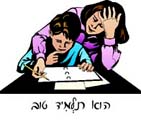
שיר י
פה שירים יפיםכיתה טו
בה כּיתות טובות

ASK NOT ...
A famous Israeli scholar of Aramaic, E.Y. Kutscher, was teaching an eager class of beginning graduate students. They fired all sorts of questions at him. He put them off gently with this remark: "It is as important for a good teacher to know what not to teach, as to know what should be taught."
I
n a similar vein, a professor of Russian was fond of declaring: "That is an excellent question about Russian. But we are not here to learn about Russian. We are here to learn Russian!At this stage, it is important to focus on using
Hebrew. There will be lots of time for more abstract, analytical examination
of the Hebrew language after you have become comfortable listening and
speaking at minimal levels. At that point more extensive discussions about
Hebrew grammar will be more meaningful and even enjoyable.
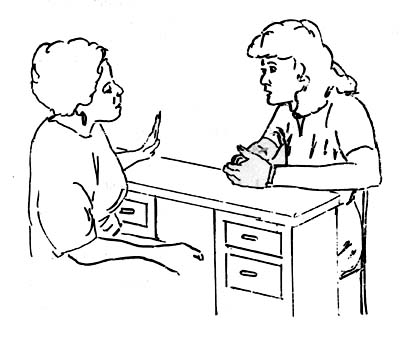
Please resist the temptation to coax your instructor into discussions which, at this stage, would have to be conducted in English.
בְבקשה לדבֵר יותֵר לְאט
59
1.42
חזרה - CLASSROOM VOCABULARY REVIEW -
![]() Use with Software Chapter 2:13 "Drill
on Masculine and Feminine Commands"
Use with Software Chapter 2:13 "Drill
on Masculine and Feminine Commands"
Match these phrases that your instructor has been using with their English equivalents.
100.00 %
(Draw a line between matching pairs.)
יופי
Greatמְצוּיין
Repeat after meתֵן לי לִרְאות
everyone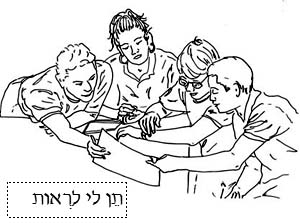
לחזור אחרי
י slowerכוּלם
excellentיותֵר לְאט
let me seeבְבקשה
pleaseבְיחד
togetherבְבקשה לְהקשיב
please listenעוד פּעם!
again
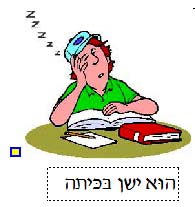
Respond with כֵּן or לא or try a short phrase. 1.42.1
עכְשיו בּוקֶר?
___________כֵּן או לא: הכּיתה גְדולה מִדיי?
___________כֵּן או לא: הכּיתה קטנה מִדיי?
__________ דינה בְּסוף השוּרה או בְּהתְחלה שֶל השוּרה?________אֵיפֹה הלוּחַ? _______
60
1.42.2
חזרה
- Review of Classroom Phrases: Practice Writing and Spelling Listen to the audio and then write what you hear for
each sentence.
100.00 %
דוּגמה יֵש תלמידים בכיתה?
יש סֵפֶר בכיתה?______________________
יש לוּח גדול בכיתה?___________________ יש סטודנְטיות בכיתה?
כֵּן או לֹא: אֵין סֵפֶר בכיתה.
כֵּן או לֹא: אין סטוֹדֶנְט עיֵיף בכיתה._________
יש תלְמיד גבוהַּ בכּיתה? מי? יש סֵפֶר קטן בכּיתה? אֵיפֹה? יש לוּח שחור בכּיתה? יש מפּה גְדולה בכּיתה? 1.42.3 Circle the right phrase for the situation: (Some
vowels have been deliberately left out)
100.00 %
1. You hold a door open for someone and urge them to go
in.
א. שלום
ב. בבקשה
ג. לא, לא!
ד. סליחה 2. You would like to hear something again.
א. עוד פעם, בבקשה
ב. לחזור אחריי
ג. בְקול רם
ד. קטן מדיי 3. You want to know who the book belongs to.
א. שֶל מי העֵט?
ב. אֵיפה הסֵפֶר?
ג. שֶל מי הסֵפֶר?
ד. אֵיזה סֵפֶר? 4. You are providing a description of an acquaintance.
א. לְחיים
ב. הוא אמֶריקאי
ג. חוּלְצה
שְחורה
ד. שֵׂי 5. You try to explain why you can't take the phone
message.
א. אֵין עיפרון
ב. יֵש עֵט
ג. המחְבֶּרֶת גְדולה
ד. אני עיֵיפה 61
1.42.4
לְמלֵא אֶת החסֵר
Test Yourself
Fill in the blanks with the Hebrew word or phrase with the same meaning from
the word bank on the next page.
בְבקשה לְמלֵא אֶת החסֵר 1. I'm pleased to meet you
___________________________ 2. let me see (m)
___________________________________ 3. what's your name?
_______________________________ 4. too fast
________________________________________ 5. yes
___________________________________________ 6. excellent
_______________________________________ 7. class
__________________________________________ 8. slower
________________________________________ 9. please write
10. no
___________________________________________ 11. what's this?
____________________________________ 12. I don't know (m)
________________________________ 13. again
_________________________________________ 14. a new song
____________________________________ 15. good morning!
_________________________________ 16. Let me see (f)
__________________________________ 17. my name
______________________________________ 62
1.42.5
אוצר מילים
Word Bank (Nikkud has not been included)
100.00 %
כיתה
מצוּיין
שמי
כן
לא
מה שמך
עוד-פעם
יותר לאט
מהר
מדיי נעים מאוד
שיר חדש
אני לא
יודע
?אני לא יודעת
בוקר טוב
מה
זה בבקשה לכתוב
תן לי לראות
תני לי לראות
1.43
קריאה בּתנ"ך
READING BIBLICAL PASSAGES Now that you have learned all the letters of the Hebrew
alphabet, we are going to introduce an important word that you cannot read
even knowing the letters. One of the names of God is written
We read it "Adonai" since Hebrew speakers do not pronounce
this name of God. In English, people have read it Jehovah or Yaweh. You
should memorize this word and how to read it. When you see the letters 63 A concise list of the grammatical notions we have seen in this CHAPTER You have been been exposed to many words and phrases in
this unit. The grammatical analysis of some of them has been
deliberately postponed. But it may be useful to summarize the topics and
to refer to the sections where they are used or mentioned in the unit. Nouns and grammatical gender ¶1.39.1 Word stress in Hebrew (with a note on Position of adjectives ¶1.28.3 Agreement" of nouns and their adjectives ¶1.39.2 The prefixes Interrogative (Question) words:
מי ,מה ,איפה
¶1.34.1 Comparative form of adjectives "bigger" ¶1.18 "Consonantal" ה
at the end of a word, contrasted
with "vocalic" ה.
¶1.5.9; ¶1.41. The dagesh ¶1.16 Double vahv, yood ¶1.14.3; ¶1.14.6;
¶1.18 The furtive patax
לוּחַ
¶1.42.2 The shvah ¶1.5.5; ¶1.22 Diphthongs ¶1.14; ¶1.14.6 Subject pronouns
(singular) ¶1.10 Spelling of "foreign" words ¶1.25 Stress of syllables in "foregin" words ¶1.25; ¶1.23 The definite article
¶1.7 "Having" something ¶1.34.3; ¶1.42.1 Negation ¶1.42.1 The use of yood to "protect" the consonantal
value of vahv ¶1.26 This list is long! In Chapter One you have a beginning
introduction to the grammatical concepts listed above, often through usage
in phrases. You should not feel that you must have mastered these topics
at this stage of your study. We will take them up again in the upcoming
chapters. The most important things for you to know now are: 1. The letters of the alphabet 2. How to read. 3. How to write what you hear. 4. The words and phrases for getting acquainted and
functioning in the class in Hebrew. 5. Pronouncing the sounds of Hebrew (as you sing
the two songs you have learned). 64
![]()
![]()
![]()
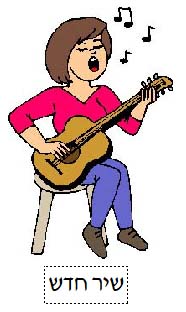
 ____________________________________
____________________________________
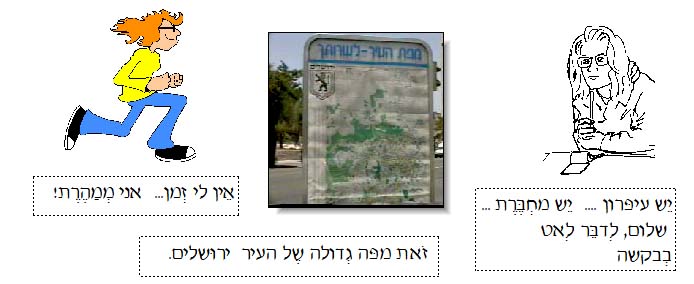
הֶעָרָה
No "in between" ?
There is no "neuter" gender in Hebrew. Every "it" must be either a male or a female "it."